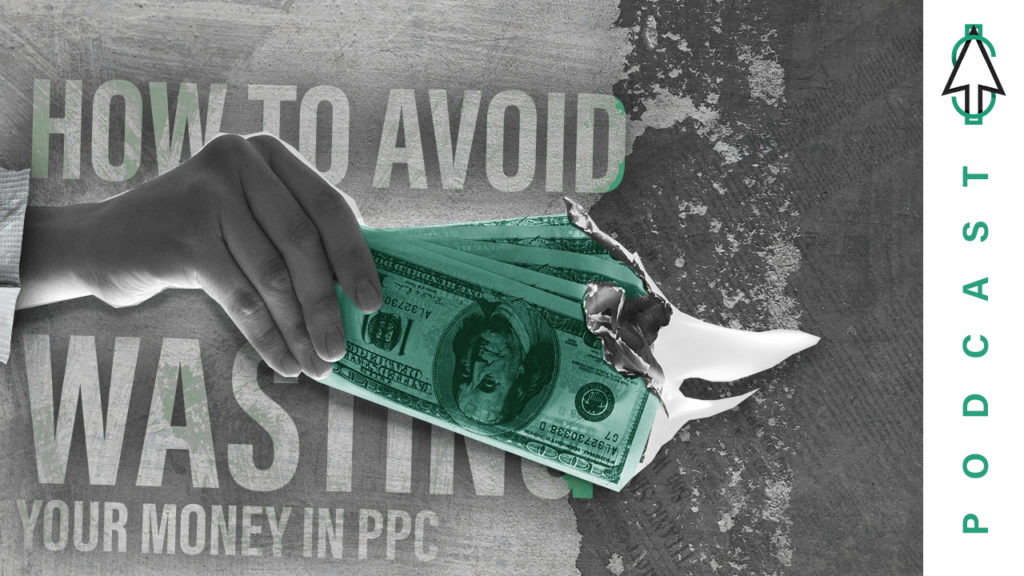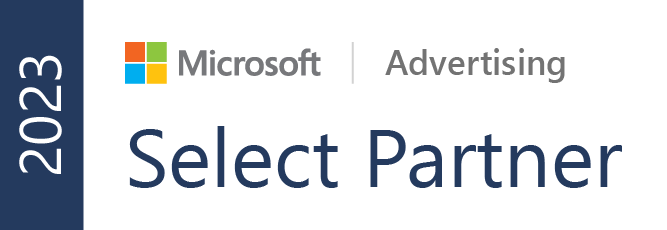
Episode 6
How to Avoid Wasting Your Money in PPC

Watch
All right, welcome back to Paying for Attention. Today, we’re going to be talking about how to avoid wasting your money in PPC. And today we’ve got with us Keegan Brown as well as Andrew Hollington. And so let’s go and get started. Pay attention. All right, guys, it sounds like there’s a lot of experience in this room between the two of you guys have dealing with some common mistakes about clients wasting money with doing bad things and PPC, right?
Yeah. Yeah. All right. So what is that what are some of these common mistakes that you guys have seen that you can share?
Yeah. So the because we do so many audits for so many different advertisers when we’re looking at working with a with an organization one, we see a lot of things, too. We spend a lot of time trying to be as efficient as possible in looking for opportunities. And so the first thing I always look for and the things that I find all too often is that’s very, very quick is going in and looking at their location targeting. And this is huge for so many different types of businesses, for local and multi location businesses, for higher education.
Really, anybody that’s targeting a specific location and who doesn’t want, you know, people from a different country or outside their their targeted goal to be searching and clicking their ads. And so the the piece that I always go and look for is look at targeted locations versus matched locations. So you should go in and go check that, because all too often I find in the match locations, states or countries that have been spending money outside your target, Agios, and is typically either one not performing well because those people are realizing, hey, this service is in a whole different country or state.
I’m not going to, you know, fill out this form or give a phone call. The other example, and I see this all the time with higher education is if you’re targeting, you know, the United States and you’re not you don’t have your settings set up correctly, students or prospective students from other countries are searching, filling out the forms, India, Pakistan, Brazil. If you’re not trying to target those countries, you’re wasting money on those, first of all.
The other problem that happens with that is that they’re typically pretty cost effective because they convert at a high rate. They’re usually very low cost per click because of the the lower competitiveness in those countries. And so you start optimizing and especially using bitting automated bidding strategies, you start optimizing for those out of country conversions and out of country clicks. And all of a sudden you start to see your your spend in those countries increase quarter after quarter. And so you end up finding it.
We see this all the time and it’s unfortunate, but I would say eight out of 10 audits that we do, we see roughly 10 to 20 percent of their budget being spent outside their targeted use.
Yeah, 100 percent and one of the I think the main reason for that is that Google defaults the setting to and they’re and they’re recommended setting is to do so because their goal, as we all know, is to spend your money. Yeah, sorry. Sorry about it. But it is the truth. And so really, it’s it’s the default setting. So if you don’t intentionally go in there and reset the setting, you’re going to you’re probably going to see this.
And that’s why we see it’s that’s why it’s so common. And so I’ll give you a little insider info. And it’s another issue with it is that Google has gone through so many iterations of this setting. They’ve renamed it two or three times in the last five, six years that we’ve been doing this. And what it is now is you just want to go into your location, the advanced settings, and you’ll want to make sure that it’s not the recommended one.
The recommended one is going to say people in, regularly in or interested in your targeted locations that interested in is the key part that’s saying, you know, maybe a prospective student in India is interested in school in the United States and they are searching that Google is going to determine that intent with their eye and target them. What the setting that you want is people in or regularly in your targeted locations. And it’s not the default. You got to check it.
Same thing with exclusions. If you want to exclude it, make sure we we have a better safe than sorry policy. I think we we teach analysts from the start just if if they only if the client only wants to target the United States. That’s their key. That’s the key demographic. That’s where the leads they want the leads from. Then just go ahead and exclude Canada, exclude Mexico, just make sure that it’s there with an exclusion from the start.
Yeah.
What about like we see that’s been on certain types of searches like, I don’t know, pay or like pay your bill or free customer service. What about things like that.
Yeah, so it really depends on the industry, but because there is very industry specific, if you are a software company, Log-in is huge. If we’ve audited some large software companies that have wasted a ton of their budget on current customers looking for their brand name, log in or cancel. There’s also things like customer service. When you look at e-commerce, customer service, big one shipping free. Also things like phone number. If you’re an e-commerce store and people are searching for your phone number, I would say 70, 80 percent of time.
They’re not looking to buy anything depending. It might be different for you, but probably not. And and so you really have to think about industry specific and and look for those free jobs. Jobs is a huge one. Careers, especially for a big company, likely wasting a lot of money on those those types of searches.
The other ones all add in that you should just look at performant, look at performance on. It may not always be the case, but typically when questions are being asked how to how do I do this? Where to find what what is what is your service? Insert your service here. Right. Like, that’s not a very high end Tenke. Whether they’re doing research, you may not want to spend money and send them to a bottom off on a landing page if they’re searching, what is your service?
You know, so check performance on how to what is and and there’s there’s a cool trick that we use called an engram report that kind of funnels all of those how to what. And you can you can look at. All right, when how is searched, how how does that perform all totaled up into one column. And it really lets you see, like, wow, you can see some crazy trends there. You know, you might see three x five X cuts, really.
You cut your costs really go there.
What about things like making, you know, not making adjustments based on, like target audience? Can we talk a little bit about target audience?
Yeah, yes, I’ll do the first couple, so, you know, we work with a handful of eye care physicians and and things like that, and one of the big ones is cataract surgery. You’re likely not going to get cataracts until you’re at least 50 years old, they won’t do cataract surgery on you, right? So you should probably not be showing ads to 18 to 24 year olds and, you know, 25 to 34 year olds. And a lot of times people are searching that.
And as you’ll see it kind of going back to the other thing, the other wasted outspend is the search queries, which is cataracts for dogs. Right. That’s a pretty common search that we’ve seen. And we have to figure it out immediately when we launch a cataract surgery campaign. So, you know, age is a big one there that that really is big. And then things like if your core demographic is, you know, be to be, you know, making sure you’re turning off during certain times of the day or during the weekends to because hopefully most people are not working on the weekends searching for your products and services later.
Again, it’s a it’s a I would say it’s a default setting issue. Right. If you if you just launch a campaign, how Google wants you to launch it there, they’re going to launch 18, 65 plus. You know, you have to intentionally go in and have those settings based on your your customer demographics. Another big one is, is gender. And and it might not matter for most a lot of companies, but some companies it does.
Take a look at your analytics. If you haven’t launched the campaign yet, go into analytics, see what see what your traffic looks like right now or do you have more 75 percent female customers? And that needs to be your focus and judge performance based on that start intelligently is is what we recommend. You know, start with your core audience and work your way out. You can never go wrong. Starting small.
Very good points. What about. Let’s get down to. Mobile and desktop stalked by a little bit about that, we talked about the gender, we’re talking about ages of your target audience and demographics. Let’s talk about getting down to mobile devices.
Yeah. So the the big thing here, and it’s something that I do again, almost immediately because it takes almost no time to check. If you look at your segments, you segment by device at the campaign level, you can quickly see down the line how each campaign is performing by device and it quickly segments it and you can change the date range to whatever you need to. I would make sure you have at least a few weeks of data in there, depending on how much you’re spending.
But the key thing here is, is that. Searchers have different intent and different behavior based on where they’re searching from, be it a desktop, a phone or a mobile device or tablet. Right. And so they behave differently, meaning they convert differently. The cost per click is different. And that means your performance is going to be different. And if you’re not adjusting for that, you can be in some serious trouble, especially ecommerce, where we all know if you’re looking at a product that you’re on your phone and you’re like, OK, I want to buy this.
That user experience is not great on your phone, trying to check out type in your credit card number, doing all your billing address and all that. It’s not very fun to do on your phone. So people bounce, people leave, and maybe they come back through a desktop later on. So what happens is, is as mobile traffic continues to grow for almost every single industry, your budget is being wasted or somewhat wasted on mobile devices and mobile searchers who really don’t have a whole lot of intent to actually purchase after they click your ad.
And so if you’re, you know, first thing to do is check, make sure if you do see something that is way off, you can go in and actually make adjustments to those devices, bring down the cost per click for that device and increase the cost effectiveness overall for that campaign.
That’s the biggest thing, is that it is now a mobile first world, it’s I think I think it seems like it was recent, but it’s probably two years ago at this point that Google came out and announced that for the first time ever, more searches were done in that year on mobile devices than desktop computers or laptops. Right. So it’s it’s more imperative than ever, especially, like you said, for e-commerce, especially for B2B, when, you know, they’re going to have higher content when they’re sitting at their desk ready to make a decision.
So it’s really, really imperative now and a mobile first world. And Andrew, so are you saying that we should never bid on mobile traffic?
Not at all. At all. That’s that’s that’s a good point. I’m not saying completely. Take away mobile traffic. Look at performance, judge what you need to do with the bid based on how it’s performing. If it’s 30 percent higher than your cost per lead, go bid down 30 percent. It’s as simple as that.
Very good points. And I mean, how many times we’ve seen that, you know, even when it comes down to looking at mobile versus desktop of audiences with landing pages, even, you know, with the ad campaigns, that when you’re getting the landing page, it’s just an overabundance of mobile. But our clients don’t have mobile ready landing pages, so we make it mobile ready. We just their goals and conversions that we have a call button on there.
And the next thing you know, conversions go through the roof because we’re we’re adjusting it to meet the mobile needs. Super quick and easy thing to do to as you mentioned, it’s just like go on real quick and look to see. Yeah, I actually I love that you brought that up, Dan, because it’s something that a lot of PPC managers and I myself consistently forget that you can change the mobile experience. And so if you only if you know that your your website is never going to change, you have no control over it.
You’ve been complaining about it for years, then. Yeah. You know, you’re going to have to go make some mobile bit adjustments, something like that. But if you do have a good marketing team and you do have some say into the website, bring that up to your team and say, hey, if we can increase conversion rate by five, 10, 20 percent on mobile, we could really significantly improve the lead volume or sales volume for our campaigns, because right now the user experience is not good.
And so you bring a whole different element. And yeah, that’s a whole another way that you don’t have to make those bean adjustments, at least not permanently, because if you improve the conversion rate, you can definitely change the performance of your devices.
Yeah, absolutely. OK, so what about talking about stretching things a little bit too thin, you know, by having too many broad keywords and things like that? What do you guys think?
Yeah, I mean, we could keep going down the rabbit hole of every single segment and setting and thing like things like that and maybe maybe on another podcast. But but we did want to bring this one up is is it we see it as a key issue even within our our own team. Sometimes we do it ourselves and we’ll admit that and we’ll and we’ll adjust from there. You have to make sure that you’re not starting to broad. And what does that mean?
Think about your keywords. Think about think about think about your budget first and foremost, and then make sure that your keyword targeting is is not too broad for that budget. So pop up some keywords into the into the keyword plan or see what see what Google says your spin could be in a in a given month and adjust from there. But we see it all all too many times as you’re trying to conquer the world for lack of a better phrase on day one with with every keyword under the sun, on every device, on every every day of the week, you know, so you can distill this down to each level that we just talked about.
And and you really want to make sure you’re starting intelligently, like we keep hitting on and making sure that you’re you’re hitting the right people at the right times.
What makes a client go, like, too broad to go start off? What makes him say, like, I’ve just got too many keywords and I’ll just go way broad with it?
Yes, so I think what you know, I think it become it it comes from years and years of people kind of pushing this thing with so where you need to be optimizing for all these different keywords and doing this crazy keyword research that, you know, we have, you know, a thousand different keywords to have. And I think even as Andrew said, our team and myself, even over the years, the first idea was, well, if I throw, you know, a hundred different keywords into a campaign, it doesn’t hurt because as soon as I see that it doesn’t perform, I can I can turn it off or whatever.
The part is, is if you don’t know how they’re going to perform and you want all of them at once and you have a limited budget, what happens is that one to maybe five, six keywords will start spending all of your budget and all of those other key words don’t even get a chance because those keywords were too broad, because you were trying to to cast a wide net. And it’s really not worth it if you just find and it’s actually relatively simple if you think about your business and what are the five core keywords you would think about your business, what do you sell?
What’s your service? And that might be a really good starting place to get started with a campaign. If you have a really limited budget, if you have 10, 20, 30, 40 K, you can start to expand that to 20, 30, 40 keywords. But it’s it’s it’s I think the really the big problem is always trying to cast a wide net, trying to think of everything from this crazy good keyword research strategy session. And really, it’s it’s not that complicated.
You just need to start small, start simple, smart, intelligent, and you won’t stretch yourself too thin. And you can always add a keyword tomorrow or next week if you like to. But starting small would really help minimize the risk of wasting budget in the very beginning.
Very cool. OK, so what about some things to avoid or as a takeaway for the audience to grasp on to?
Yes, I think the first thing and not to contradict myself with this, you know, big strategy session and all that, but on the you know, don’t do that for the key words so much. But think about your your customer persona and who they are when they’re searching, you know, their demographics, where they’re at all that information and set your campaigns up right from the very beginning. Make sure your location settings are in line. Look at Google Analytics, what gender and ages and geos they’re coming from.
How is your conversion rate between desktop and mobile? Start there and start and plan that out and set things up correctly from the very beginning.
Yeah, really good point, and I think the second key takeaway is, is really, really general, but it never hurts to have a second set of eyes on your account. You can sometimes, us included, you can get blinded to an account and lose track of the of the higher the bigger picture items. Right. What is the end goal here? So our recommendation there is just get your account audited. Is it is it another is it another marketing director that knows PBC that can look at it?
Is it another agency that can come in and give a free audit? It’s it doesn’t have to be, you know, super Kelsie. Our recommendation is just audit your account regularly.
Very, very good. Sometimes that’s just asking the right questions. Yeah, right.
Well, guys, thank you so much for all the wisdom that you guys have shared today. It’s been awesome, as always, and we thank everybody for tuning into paying for attention. And we’ll see you next time.
Listen
Your Shows Hosts
Have a Question?
If you have a question regarding paid media, fill out the form below and we will do our best in answering it in our show.
























